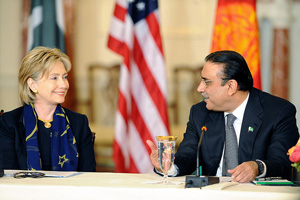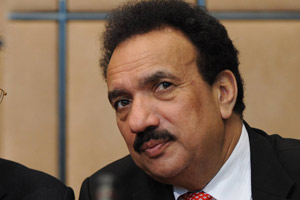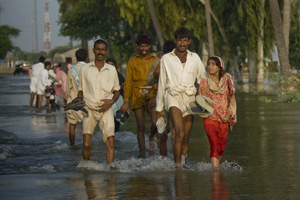I’ll have a more analytical blog post later, but for now, here’s everything that was said specifically about Pakistan by President Obama, State Secretary Hillary Clinton, Press Secretary Robert Gibbs, Secretary of Defense Robert Gates, and General Cartwright during today’s report and press briefing about the US’s Afghanistan-Pakistan strategy. Both videos are embedded at the end of the post. I’ve bolded the bits I thought were particularly of interest.
From Obama’s speech:
“In Afghanistan, we remain focused on the three areas… our civilian effort: to promote effective governance and development. And regional cooperation: especially with Pakistan, because our strategy has to succeed, on both sides of the border.” (3:40)
“…Focus on our relationship with Pakistan. Increasingly, the Pakistani government realizes that terrorist networks in its border regions are a threat to all our countries, especially Pakistan. We’ve welcomed major Pakistani offensives in the tribal regions. We will continue to help strengthen Pakistanis’ capacity to root out terrorists. Nevertheless, progress has not come fast enough. So we will continue to insist to Pakistatni leaders that terrorist safe havens within their borders must be dealt with. At the same time, we need to support the political and economical development that is critical to Pakistan’s future. As part of our Strategic Dialogue with Pakistan, we will work to deepen trust and cooperation. We’ll speed up our investment in civilian institutions, and projects that improve the lives of Pakistanis. We’ll intensify our efforts to encourage closer cooperation between Pakistan and Afghanistan. And next year I look forward to an exchange of visits, including my visit to Pakistan. Because the United States is committed to an enduring partnership that helps deliver improved security, development, and justice to the Pakistani people.” (7:34)
From press conference after Obama and Biden left:
Sec. Clinton: “In Pakistan, we have moved beyond a purely transactional relationship dominated by military cooperation. We now have broad engagement on both the civilian and military sides. Through the strategic dialogue that we established last year, Pakistan and the United States have begun a long-term commitment to work together not just on security but on energy, agriculture, education, health and other areas that directly affect the daily lives of the Pakistani people. There have been, there will continue to be obstacles and setbacks, but our conclusion is that our partnership is slowly but steadily improving. We have greater cooperation and understanding, and that is yielding tangible results on the ground.” (2:25)
“In Pakistan, it will be important to keep making progress in eliminating sanctuaries for extremists, and we must continue to close the gap between Kabul and Islamabad… Our core goal [is] disrupting, dismantling and defeating al Qaeda in the region, and becoming strong partners with both countries for the long term. We will not—in fact, we dare not—repeat history. We will continue to support the people of Afghanistan and Pakistan as they work to build their future—one that is secure, prosperous and free, and does not pose a threat to the people of the United States.” (5:12)
Question from reporter: “…Considering that the U.S. withdrawal date is not until 2014, how can the Obama administration continue to wage this war with so little public support?” (17:40) Sec. Clinton’s response: “…We’re trying to do the very best we can with the leadership that we’ve all been entrusted with to avoid making the mistakes that were made in previous years, where we did not develop the kind of relationship and understanding and coordination with either Afghanistan or Pakistan that would enable us to have a better way of interacting with them and perhaps preventing some of what came to pass, and where, frankly, we walked away at some critical moments in the last 25, 30 years that created conditions that we had a hand in, unfortunately, contributing to.” (19:40)
“If you had… when we came into this administration, we had very little in the way of an understanding with Pakistan that the extremists who threatened us were allied with extremists who threatened them, and that in effect they were creating a syndicate of terrorism. And in fact, when we came into office, the Pakistanis had agreed to an ill-conceived peace agreement with the Pakistani Taliban that was consistently and persistently expanding their territorial reach. And we pointed out firmly that this was not a strategy that would work for them, and in fact we had very strong objections to it because it would provide greater and greater territory for al Qaeda and their allies to operate in.” (25:45)
“So what happened? The Pakistanis took an entirely different approach. They moved, what, 140,000 troops off the Indian border. They waged an ongoing conflict against their enemies who happen also to be the allies of our enemies. They began to recognize what we see as a mortal threat to Pakistan’s long-term sovereignty and authority. That was not something that was predicted two years ago that they would do. They’ve done it.” (26:45)
“They’ve also maintained a civilian government against great odds, and something that has provided more legitimacy to our interactions with them. And we have started what has turned out to be a quite effective, robust strategic dialogue with them, engaging the whole of their government with ours. We also have helped to broker better relations between Pakistan and Afghanistan, and played a major role in bringing about the signing of something called the Transit Trade Agreement, which they had been trying to agree to since 1963.” (27:20)
Question from press: “Is it fair, Secretary Clinton, to look at this review and say, and come to the conclusion that it’s, you feel you’ve made a lot more progress with the Afghanistan roles than on the Pakistan side? And second, you were just referring to the civilian leadership. Who’s in charge of Pakistan, and… in that larger sense? I mean, who is it that’s running Pakistan? Is it the civilian government? Is it the military? Is it the intelligence agency?” (32:05) Sec. Clinton’s response: “Well, Chuck, first, I would argue that we have made progress with Pakistan, and I think the President and each of us have alluded to some of the signposts of that progress. We still have a lot to do. And the floods were a major challenge to the… not only the people of Pakistan but also to our strategy, because we had adopted an approach to change how we were doing aid to be much more responsive to what the Pakistanis themselves needed and wanted as opposed to what we thought they should need or want. And so I think that we have made progress. We’ve made progress in certainly our military cooperation but also our civilian cooperation.” (32:30)
“And I think as with any question about leadership or who’s in charge, we deal with the entire government. We, as the President said, he talks to President Zardari. I deal with the civilian leadership. We also talk to the military leadership. Admiral Mullen has developed a very positive, cooperative relationship with General Kayani. Leon Panetta deals regularly with the Director General of the ISI, General Pasha. We are in constant communication.” (33:20)
“And there are certain decisions that are made by different leaders within their government. But it would be a mistake, and it’s a mistake that the United States has made continuously over the last 63 years, to move away from the democratically elected civilian leadership of Pakistan. Our goal is to help support that leadership, help them understand how to deliver and show that democracy produces results for people. And we intend to do that. And that’s… so our answer is we deal with the leaders of Pakistan, and we do it in a very whole of government approach. And the strategic dialogue has given us the mechanism to be able to do that.” (33:54)
Sec. Gates: “At the same time, Pakistan has committed over 140,000 troops to operations in extremist safe havens along the border in coordination with Afghan and coalition forces on the Afghan side. Though we believe the Pakistanis can and must do more to shut down the flow of insurgents across the border, it is important to remember that these kinds of military operations in the tribal areas would have been considered unthinkable just two years ago. And the Pakistani military has simultaneously been contending with the historic flooding that has devastated much of the country.” (8:40)
Question from press: “Can you win this if militants continue to have free passage into Pakistan, find safe haven there? Can you crack down in a stronger way with the Pakistani government to crack down on their safe havens?” (14:00) Sec. Gates’s response: “Well, first of all, they don’t have a free pass at this point. There is, there are a lot of, as we say in our building, kinetic actions taking place along that border. In terms of people coming across, one of the areas of progress has been not only the 140,000 Pakistani troops working some of these safe havens in Swat and South Waziristan and elsewhere, but it is the fact that there is increasing cooperation on both sides of the border in coordinating their military operations. (14:06)
“So the Pakistanis come in behind the insurgents from the Pakistani side and, coordinating with us and the Afghans, we’re on the other side. And so they’re the meat in the sandwich. And we expect to see more of that, and the cooperation is increasing between the Afghans and the Pakistanis. Everybody knows that failure to deal with the safe havens does present a real challenge, but I would argue that we are in the process of dealing with those safe havens—the Pakistanis on their side of the border, and Afghanistan and Pakistan and us working together.”
Question from press: “I’d like to ask about the issue of Pakistan and the Pakistani safe havens. The Pakistani government has made some moves in places like Waziristan and Swat, but usually only after their own government has been directly threatened. There stil… you still have al Qaeda and Taliban senior leadership protected in Quetta and in Karachi and in other parts of Pakistan. What specifically do you plan to do to push the Pakistani government? And if they don’t go ahead with cracking down on this, what can the U.S. do, given that you say these gains that we have will remain fragile and reversible unless we solve the issue of the safe havens?” (46:23) Gates’s response: “Well, first of all, I would say that the Pakistanis have indicated their willingness to move into other areas in addition to South Waziristan and Swat. But as I mentioned in my opening remarks and as Secretary Clinton referred to, it’s hard to overstate the impact of the flooding in Pakistan and the role of, and the degree to which the military, military assets were drawn off the border to be able to deal with the flooding.” (47:15) “They also have to have an enduring presence in the places that they’ve cleared and so… to make sure that the enemies they cleared out don’t come back as well. So I think that like in many of the things that we’ve dealt with with Pakistan, things will move in the right direction. It’ll probably take longer than we would like, but they have made clear their intentions.” (47:40)
“I would say, though, that this underscores the importance of the broader strategic dialogue between ourselves and the Pakistanis. I think that they are coming to have a better understanding of the threat that is posed to them by this syndicate of terrorists that’s not just the Pakistani Taliban that’s a problem for them. And I think that the degree of cooperation and bilateral cooperation on both sides of the border is a manifestation. This is something we’ve wanted to do for a long time. We’re now doing it. We’ve wanted the Pakistanis to be on that border for a long time. Eighteen months ago I would have thought the idea of 140,000 troops on that border was an impossibility.” (48:08)
“So I believe that the relationship that we have with them and the more confident that they are that we have a long-term relationship in mind with Pakistan, then I think the more willing they’re going to be to take actions that serve both our interests.” (48:53)
Gen. Cartwright:
[in response to a question on pace of troop withdrawal] “And it’s not just in Afghanistan. It has to be in Pakistan and Afghanistan. We have the advantage in Afghanistan of having boots on the grounds so that we can actually defeat, rather than just disrupt. We have to get that kind of capability as we look towards Pakistan. That has to be done in partnership with Pakistan. It doesn’t mean you have to have American boots on the ground, but you need both. So on the counterterrorism side.” (45:40)
Sec. Gibbs:
Question from reporter regarding Washington’s concern over Pakistani nuclear capabilities and its inclusion in the review. Sec. Gibbs’s response: “David, our full relationship with Pakistan was part of this national security staff two month-led review. And for a lot of intelligence reasons, I’m not going to get into its conclusion.”
Question from reporter on date of Obama’s Pakistan visit. Sec. Gibbs’s response: “I don’t have scheduling information. I know that President Obama spoke with President Zardari several weeks ago about this and I believe it likely came up on their call in the last 24 hours. And it is an important, as I said earlier, a very important relationship that we have, and he looks forward to it.”











